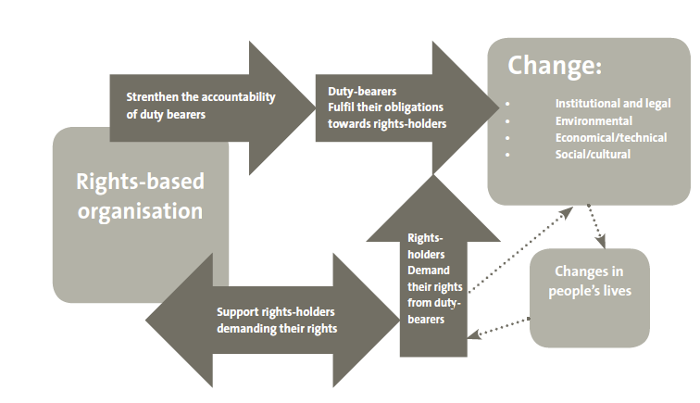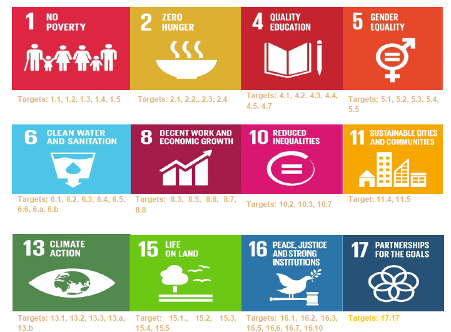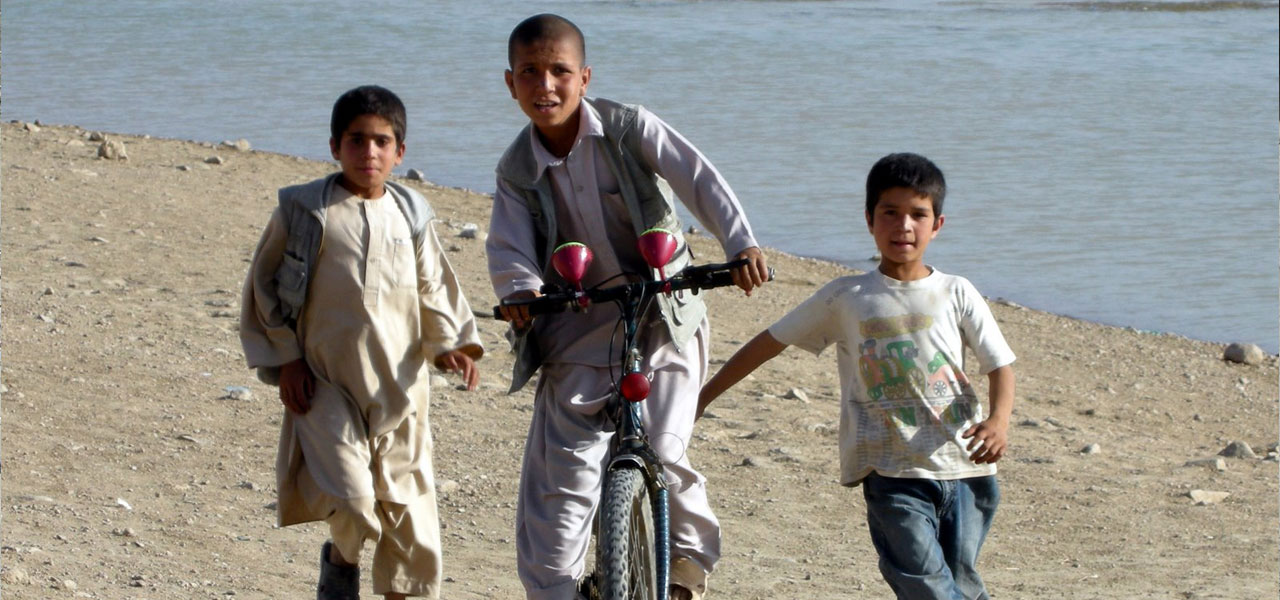- OUR THEORY OF CHANGE

BRD believes that the marginalized and poor have the potential capacity and knowledge to overcome extreme poverty and enjoy their rights. Sensitizing people to their rights and organizing them around solidarity and campaigning to increase their collective strength, will inspire them to seek right- based alternative to confront and challenge the structural causes of poverty and injustices. To reach to this aim, the HRBA programming is a fundamental pillar of our effort to build a society that is just and free from poverty, where everyone enjoys life with dignity. The concept of our theory of change is based on our understanding that most people are socially and economically poor and marginalized. BRD also believe social exclusion is an outcome of multiple human rights violations, and it is about exclusion from and unequal access to and control over resources;
Through HRBA we empower people through knowledge, kills and information and support them for their meaning fully participation in decision-making will give them ablity to control over resources. BRD see the transformational change, as projecting its vision of fairness, equity and rights, which means the target communities and local CSOs with whom we engage and works, acquiring and get empowered to realize their rights with dignity, communities particularly women and poor and marginalized people gaining confidence, capabilities and hope, in the place of hopelessness and exclusion.
- OUR APPROACHE AND WORKING METHODS
HUMAN RIGHTS BASED APPRAOCH
The human rights-based approach to poverty eradication and development lies at the very heart of BRD’s work. BRD’s approach to poverty eradication starts with the connection between poverty and human rights, from the perspective of people living in poverty. As a rights-based development organization, BRD understands needs as the basis for claiming human rights, and supports marginalized people in their efforts to claim their rights.
BRD development programming are fully complement HRBA as we promote the development interventions that address both the demand and supply side, meaning the state as well as the people: empowering right-holders to know, claim, access and realize their rights. As state is with the obligations is primary duty-bearers under international law, however there other non state actors, the also hacve the responsiblities toward the rights holders, we target each using varies startegies, to keep them accountable. HRBA is also serve as the effective tool in our advoacy starategey for our policy advoaccy work at the national and international platform.
Our process of social change is founded on the HRBA principles and our rights-based development programming. We ensure our empowerment and awareness building programmes engage both people living in poverty and duty bearers to facilitate dialogue. We identify, analyze, and confront power basis that exclude and marginalize women and man, and in general the poor. We work in partnership with local CSO and community-based organization to harness their knowledge and skills to reach to the larger constituents; and with other stakeholders both at the national and sub-national level to leverage and influence policies, decisions, and to promote the state’s commitment to human rights and sustainable development to facilitate setting the ground for sustainable change.
INTERNATIONAL PRINCIPLES FOR AID AND DEVELOPMENT COOPERATION EFFECTIVNESS
The Bureau for Rights Development (BRD) is an experienced rights-based development organization. Our strong organization structure and approach ensures program effectiveness and efficiency in achieving maximum benefits and results.
Since the development aid is a limited resource, which needs to be spent as effectively as possible in order to achieve results. Eradicating poverty and achieving strong, inclusive, sustainable and pluralistic society is the core aims of BRD rights based development agenda. As national organisation BRD is committed to fully align its programs and approaches with the international principles and best practices, to ahcieve local ownership. Ensuring meaningful participation of local civil society and communities to help alleviate poverty and strengthen national resilience. Empower local communities through more effective delivery of development cooperation programs. BRD has fullly mainsreamed relevant international agreed principles and commitments its programs and policies, to improve effectivenes of aid and development cooperation; such as 2005 Paris Declaration, the 2008 Accra Agenda for Action, the 2011 Busan Outcome Document.
BRD has fuly alligned its programs with the national strategey and proirties, those indentified through a bottom-up particpatory process, ensuring the leadership and ownership of the state, and communities at the local level. Through its rights based approach BRD is empowering local communities and civil socity to promote accountalbity and transparancy of the pulic instituions and other services providers, at the natioanl and local goverancne level. Furthermore BRD development coopration programs are aligned to fully contribut to the reializaiton of Sustainable Development Goals (SDGs).
Finally for ensuring its own accountablity, transparancy sustainablity, to delvery effective developmen cooperation programs with increased capacity, BRD has adopted an startegic objective which focused on imporving BRD internal organisation, policies and process, to ensure transparancy, accoutnablity and sustainablity of organisation in relaization of our aim, mission and committmetns.
CROSS CUTTING THEMES
Gender: BRD considers gender mainstreaming as an integrated component of its RBA in both the context of internal organization structures and roles, as well as in our operation. This includs female representation in all its operation. Through gender analysis, identify the different needs, interests, rights, and opportunities of women, men, boys, girls, their different roles, the level of power they hold in their communities and the impact of these differences on their lives are examined. The result are incorporated in the program strategey to ensure that the root causes of the gender inequalities are addressed. Adopt disaggregated indicators in the program result framework to monitor against and measure the results of gender mainstreaming. Collect gender and age-disaggregated data of output and outcome throughout program to know the result of gender mainstreaming. Gender-sensitive monitoring and evaluation is carried out to know that the program have created gender inequalities and to know the potential impact.
Envoironment: BRD systematically integrate environment into the operation and programs/project, both in design, implementation and evaluation, including its impact assessment. BRD established Environment Management System (EMS) , consisting of key processes i.e. identifying significant environmental aspects and impacts of the organization; Communicating EMS information for employee competency, and monitoring and evaluating environmental performance and compliance.
For integration and follow-up, the environmental prospective in program and projects, we uses the following tools: 1. Identify key environmental risks, in the target areas and who is affected and how? including the identification of key mitigation measure to be included in the program/project strategy. 2. Conduct Environmental Impact Analyze (EIA) to identify positive or negative impact of the program/project on the environment and vis versa. 3. How can we make adjustments to our program/project to reduce the negative impact and increase the positive impact on the environmental risks.
Conflict Sensitivity: Conflict sensitivity focusing on the elements causing or triggering the conflict, an assessment of the power relations. BRD is committed to be fully impartial in our work. We treat our target groups as active agents of change and work with them as partners rather than recipients with the aim to facilitate change rather than impose it. We work together to identify solutions to local issues. Applying the conflict sensitivity approach in the BRD work means basically understanding the relational framework in which the BRD programs and projects operate, interact and impact with the aim to avoid creating negative impact. Thus, conflict sensitivity approach applies to all contexts, regardless of the level of tensions and violence. Hence, it is important for BRD to ensure that the development programming is sensitive to conflict factors. Furthermore BRD has fully adopted the principles of Do NO HARM which is the key tool for conflict sensitizing the projects and programs i.e. analyzing dividers and connectors to helps bringing an understanding of the context for program delivery.
BRD APPROACH TO POVERTY ERADICATION
BRD believe that poverty is a complex and multidimensional phenomenon; stemming from systemic barriers and discrimination, depend not only on the lack of resources, because, even when resources are available, but access to them is also often denied to the poor because of who they are, where they live, or sometimes simply because of neglect and lack of concern. BRD’s approach to poverty eradication starts with the connection between poverty and human rights. In Afghanistan context BRDs response is consisting of multi-dimensional approach, with key examples 1) Power and Voice; empowering of the target to clime their rights and promoting their participation in the decision making; 2) Resources; providing livelihood opportunities to man and women with sustainable livelihood program; 3) Opportunities and Choice; Supporting boys and girls education and professional development of youth.
SUSTAINABLE DEVELOPMENT GOALS (SDGs)
As the rights-based organization, we are committed for our action to contribute towards achieving Sustainable Development Goals (SDGs). They are fully aligned within our organization 5 years strategic plan (2021-25). The achieved result in 2023 through the program delivery based on the organization strategic objectives were relevant to the key targets of the bellow SDGs.

HUMANITERIAN PRINCIPLES AND CORE HUMANTERIAN STANDARDS (CHS)
Humaniterian Principles
The principles provide the foundation of our action and its govern the way our humaniterian response is carried out:
CORE HUMANTERIAN STANDARDS (CHS)
BRD align the Core Humaniterian Standards with with its internal procedures and uses it as basis for performance verification, assessment, evaluation, or other aspects of accountability. Fully intergrade SPHERE minimum standards in our response:B
Core Standard 1: People-centred humanitarian response: People’s capacity and strategies to survive with dignity are integral to the design and approach of humanitarian response.
Core Standard 2: Coordination and collaboration: Humanitarian response is planned and implemented in coordination with the relevant authorities, humanitarian agencies and civil society organisations engaged in impartial humanitarian action, working together for maximum efficiency, coverage and effectiveness
Core Standard 3: Assessment: The priority needs of the disaster-affected population are identified through a systematic assessment of the context, risks to ‘life with dignity’, and the capacity of the affected people and relevant authorities to respond.
Core Standard 4: Design and response: The humanitarian response meets the assessed needs of the disaster-affected population in relation to context, the risks faced and the capacity of the affected people and state to cope and recover.
Core Standard 5: Performance, transparency and learning: The performance of humanitarian agencies is continually examined and communicated to stakeholders; projects are adapted in response to performance.
Core Standard 6: Aid worker performance: Humanitarian agencies provide appropriate management, supervisory and psychosocial support, enabling aid workers to have the knowledge, skills, behaviour and attitudes to plan and implement an effective humanitarian response with humanity and respect.
ACOUNTABLITY TO AFFECTED POPOLATION (AAP)
To improve the quality and effectiveness our humaniterian response and accountablity to the crises affected popultation, BRD is adhere to the bellow commitments:

TAKE ACTION
Get inspired, get involved, become a donor and give a family a fair chance to succeed. DONATE© 2022 Bureau for Rights Based Development | دحقونو پر بنسټ پراختیایی موسسه
made with 🧡 by Emeka and Karina
| Cookie | Varaktighet | Beskrivning |
|---|---|---|
| cookielawinfo-checkbox-analytics | 11 months | This cookie is set by GDPR Cookie Consent plugin. The cookie is used to store the user consent for the cookies in the category "Analytics". |
| cookielawinfo-checkbox-functional | 11 months | The cookie is set by GDPR cookie consent to record the user consent for the cookies in the category "Functional". |
| cookielawinfo-checkbox-necessary | 11 months | This cookie is set by GDPR Cookie Consent plugin. The cookies is used to store the user consent for the cookies in the category "Necessary". |
| cookielawinfo-checkbox-others | 11 months | This cookie is set by GDPR Cookie Consent plugin. The cookie is used to store the user consent for the cookies in the category "Other. |
| cookielawinfo-checkbox-performance | 11 months | This cookie is set by GDPR Cookie Consent plugin. The cookie is used to store the user consent for the cookies in the category "Performance". |
| viewed_cookie_policy | 11 months | The cookie is set by the GDPR Cookie Consent plugin and is used to store whether or not user has consented to the use of cookies. It does not store any personal data. |
We are currently unable to accept donations by credit card. We are working to make this option available as soon as possible.
To donate, please contact us at info@brd.org.af.
Thank you for your understanding at this difficult time!
BRD Team